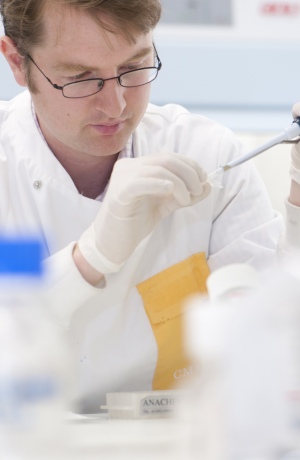Imperial academic offers thoughts on balancing parenthood with a science career

Scientist and father Dr John Tregoning shares his thoughts on a Royal Society campaign about balancing family life and a career in science.
The Royal Society campaign ‘Parent Carer Scientist’ celebrates the diversity of work life patterns of 150 scientists across the UK. The project aims to encourage and inspire current and future talented scientists to succeed in science regardless of their commitments outside work. The recurring themes across the profiles highlight the vital role that a supportive employer, family friendly policies and funding play in enabling researchers to combine a vocation for science with family life.
Below, Dr John Tregoning, a Senior Lecturer at Imperial, shares his personal experience and advice on combining a career in science with parenthood.
It’s tricky
Can you combine being a parent and being a scientist? The answer is yes, it is possible; but it is tricky. If you have children, you know this already and my telling you that it is tricky won’t help. So I have selflessly done some grade A research/ went drinking with some other parents to come up with the following tips.
Where’s your negative control?
Essentially, parenthood is a sociology experiment, with no control arm: unless you have identical twins – in which case all kinds of (ethically questionable) studies are open to you. Remember that your children have nothing to compare against: they only have one childhood and have no objective way to assess their situation relative to their peers. This is not a call to be a terrible parent, rather a salve to the conscience. Missing the year 3 show, failing to buy a new costume for world-bloody-book day or sending them in wearing uniform on mufti day isn’t going to cause, too much, long term damage. Being a tiger parent does not make your child a better person, so relax, it’ll be ok.
Outsource
More broadly, there is a lot of stuff that needs doing, is relentlessly dull and not going to improve you, your science or your children. This includes renewing the car tax, going to the tip, ironing pants, tidying the garden, sorting the recycling and making pack lunches. Many of these functions can be done by someone else – for example thanks to Jamie Oliver (at least according to Jamie Oliver himself) school meals are now delicious, nutritious and don’t have turkey twizzlers, so sign your kids up for school dinners and spare yourself 15 minutes of stress every morning. Where possible, outsource.
Get up and leave

Dr Tregoning in the lab where he works on vaccines for respiratory infections such as flu
There is a clear exception to my laissez faire attitude to child raising - failing to collect kids at the end of the day. The day’s activities need to be juggled to make sure you are in the right place at the right time. Some activities merit re-arranging childcare – vivas, experiments, group networking in the pub. Others do not. If a seminar is over running and the alternative is being late for nursery then you have to get up and leave. Likewise with meetings that drag on after 5pm when you are on pick up, politely apologise, and get up and leave. I know many parents find this difficult and it is: but sometimes you have to get up and leave.
Martini Mondays
Essentially the major challenge of balancing parenting and science is juggling: working out which parent is doing what and when. Rather than doing this piecemeal make it a social event. Set aside an hour a week to sit down together and sync diaries with a drink. Include the other admin necessary to make the house run.
The uncomfortable truth
The sad fact is that to be a parent and a scientist, there is little space to do anything else. There are only 168 hours in the week. Use them as efficiently as possible, but even with clever outsourcing, smart timetabling and being a martini fuelled admin ninja, there is a limit to resources, mental capacity and time. Career, hobby, children, carer, partner, community service, exercise, charity work, social-life: pick three, do them well, if you try to do more, something will give.
You can do anything you like as long as it is science and kids
These methods should help you balance work and childcare, but, as I said, they leave little room for anything else. This is problematic because the ‘anything else’ is important for mental wellbeing, improves your science and generally makes life worthwhile. Maybe I should qualify my statement, there is little room to excel at anything else. You have to accept you won’t be winning the Epsom Common Allotment Society marrow growing contest, breaking the 4 minute mile or eating out with friends any time soon. It may mean taking your foot off the gas at work occasionally, but find time to do a little exercise, potter around the garden and snatch the occasional after work pint here and there.
You can read more from Dr Tregoning on his blog.
Article text (excluding photos or graphics) © Imperial College London.
Photos and graphics subject to third party copyright used with permission or © Imperial College London.
Reporter
Dr John S Tregoning
Department of Infectious Disease